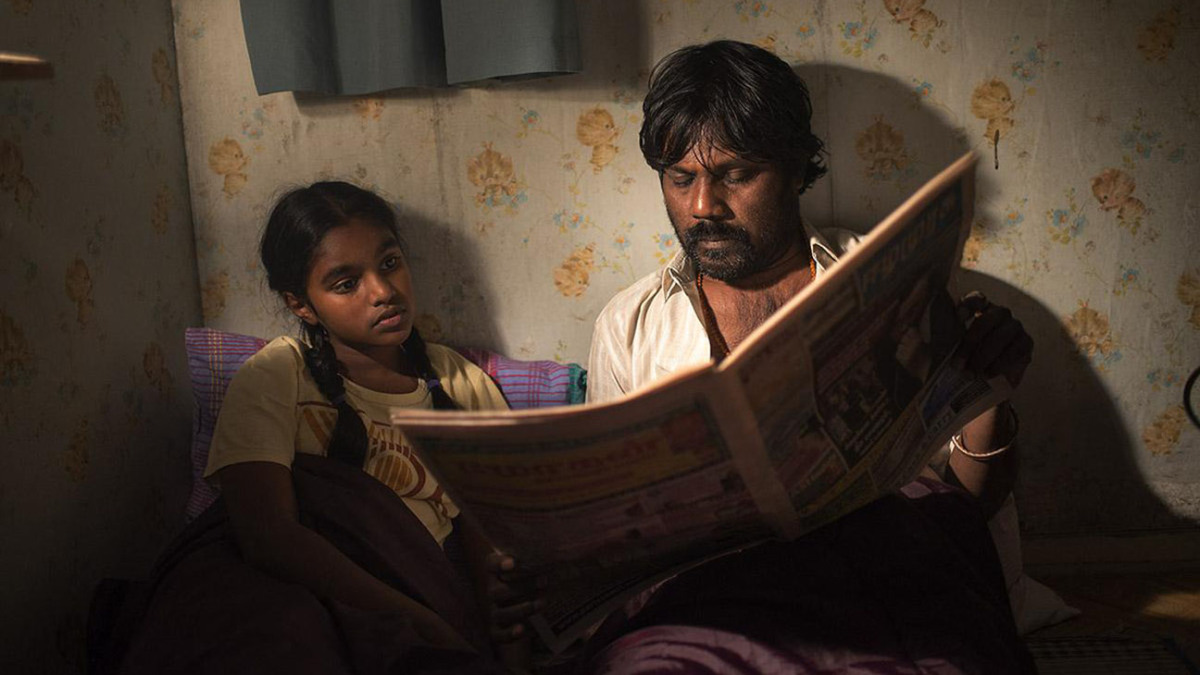Winner of the Palme d’Or at Cannes 2015, Jacque Audiard’s (Rust and Bone) most recent cinematic foray, Dheepan, is a disconsolate drama with gentle collisions and murderous folds. Starring activist/writer Anthonythasan Jesuthasan in the eponymous role, he’s a refugee from Sri Lanka, where he was a Tamil Tiger in the civil war that saw his battalion wiped out and his wife and daughters slain.
Out of desperation, fleeting prospects, and a sliver of hope for some kind of reparation, Dheepan finds himself in a refugee camp assembling an extemporized family in order to flee to Paris. Yalini (Kaleaswari Srinivesan) is in her mid-twenties and Illayaal (Claudine Vinasithamby) is a nine-year-old orphan, the three of them will unite as a family in order to find freedom via political asylum.
Audiard eschews a lot, but not all, of the “square peg in a round hole” plotting one might expect in such a film, but as the opening sequence, showing Dheepan set ablaze a mass grave, presumably containing his regiment and perhaps his family, this is not “feel good” cinema.
Dheepan and his freshly minted “family” are strangers to each other, they barely speak the language, and once uprooted to Paris it’s Illayaal who’s suddenly the best communicator, and she’s an innocent reeling from trauma and a certain degree of survivor’s guilt. They all are.
Finding a new home in a crime-addled tenement in the banileue district of Le Pré-Saint-Gervais – essentially a ghettoized poor trap – it’s not too long before they come around to falling into familial roles.
It’s a bumpy transition, at times painful to see. Illayaal doesn’t want to go to school, and has a hard time fitting in and avoiding bullies. She’s so wide-eyed and wounded, owing in no small part to Vinasithamby’s authentic and naturalistic portrayal of her that it’s impossible not to root for her.
As events uncoil in the tenements, which are run by rival gangs, daytime shootings trigger traumatic flashbacks for Dheepan and his family.
Dheepan is well known on both sides of the cartels in the banileue as he’s a caretaker there, and Yalini, working as a maid there as well, becomes a recognizable face to many of the mobsters, including Brahim (Vincent Rottiers, a dead ringer for the young Edward Norton, and with a similar intensity), a volatile criminal who displays many moments of empathy. But a fatalistic and dire inevitability soon descends upon these discordant figures but the outcome remains unpredictable.
Much to Audiard’s credit the immigrant/refugee polemic he presents is completely unburdened by didacticism and shibboleth, and moments of allegiance and love soften the intentionally rougher edges.
A chimeric, dream-like affection haunts much of the film – repeated imagery of an elephant, a symbol of remembrance and history, perhaps – attends Dheepan many times, as does a detached and hypnagogic floating camera during a tense and fearful climax. And, far from being a requiem to those fallen between the cracks, Dheepan offers a stirring and satisfying catharsis, suggesting that love saves and absolve us.
Taste of Cinema Rating: 4 stars (out of 5)
